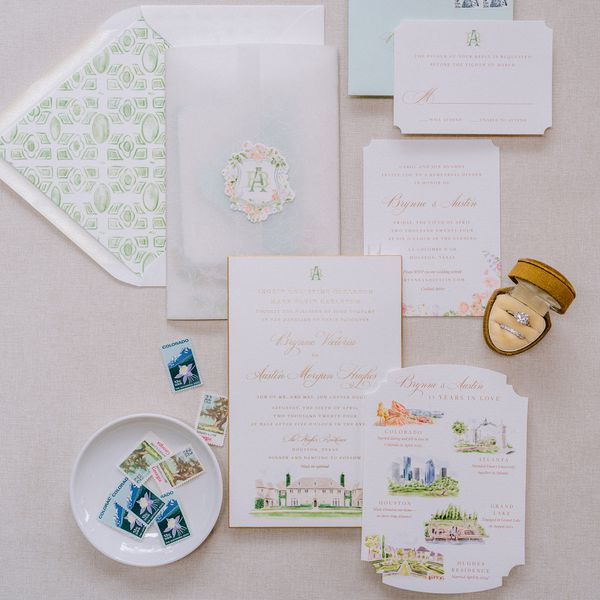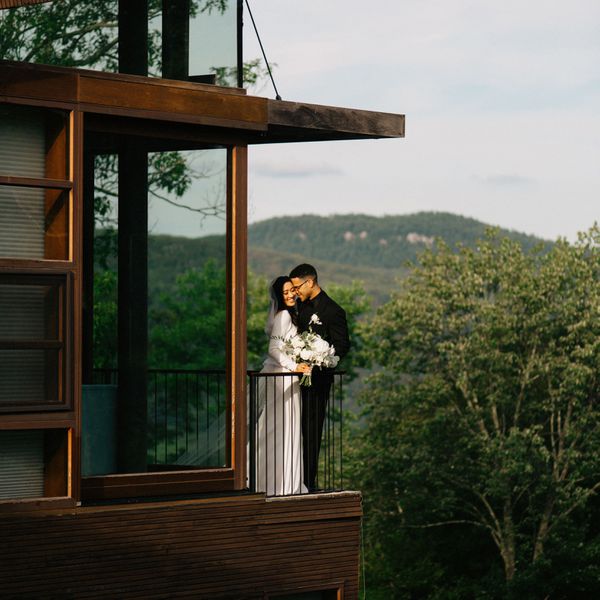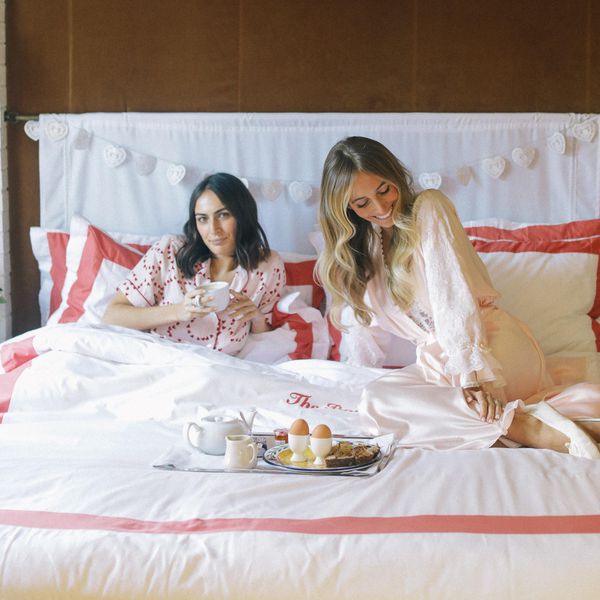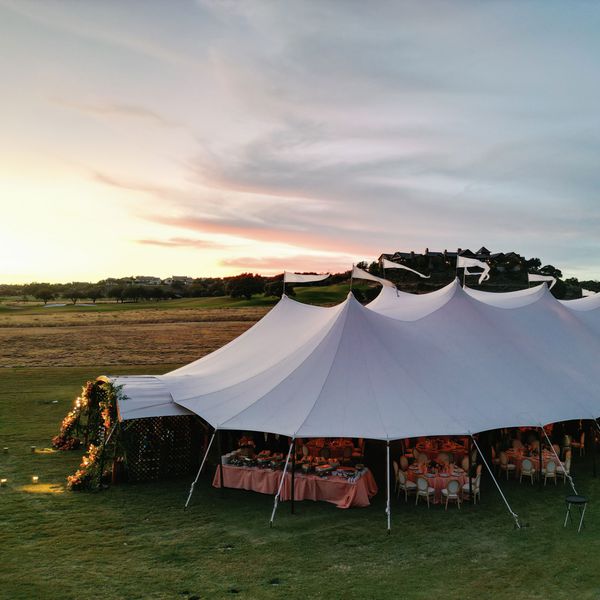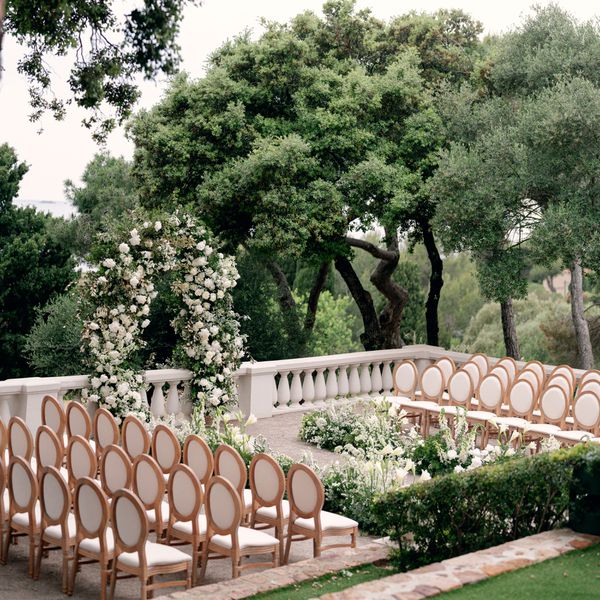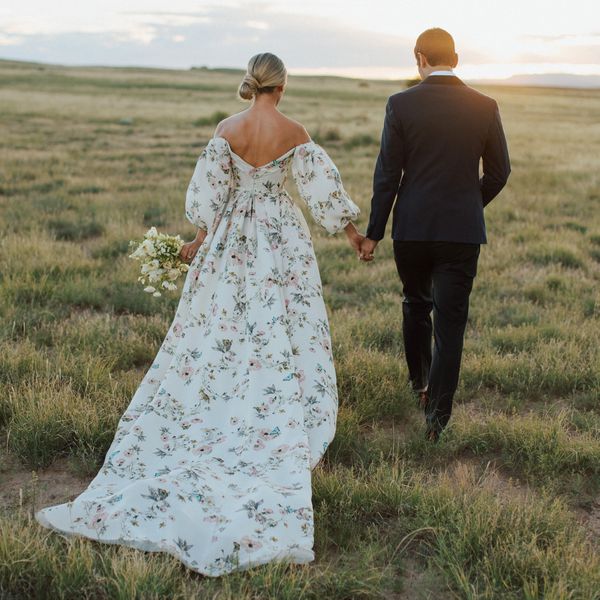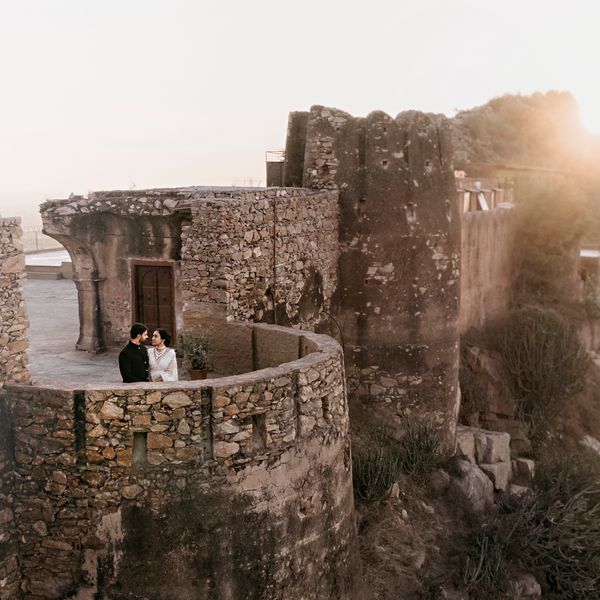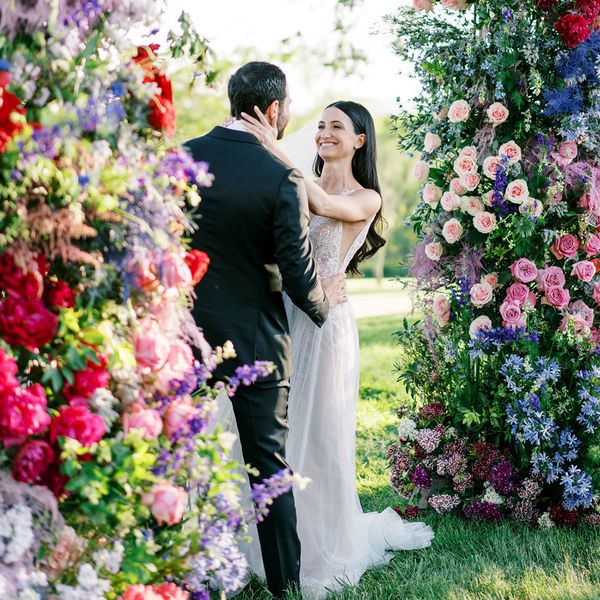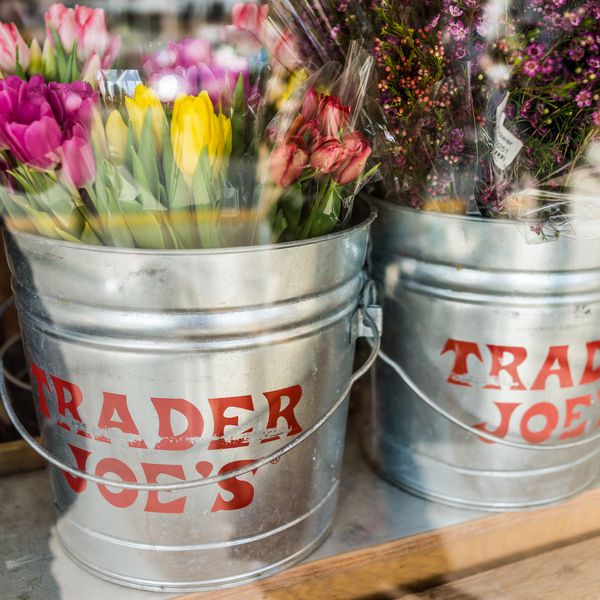
Photo by Abby Jiu Photography
A beautiful, memorable wedding doesn’t require a fancy, five-star venue—just ask any couple who exchanged vows in their backyard, eloped to a Vegas chapel, or set up a ceremony on their favorite public beach. Whether you’re hosting a low-key reception for 200 of your closest friends or an unforgettable tasting menu-meal for a group of 10, you do need to choose a spot: It might be a country club or a private garden, an under-the-radar speakeasy or a rented estate, a lawn overlooking the ocean or a lodge surrounded by mountains.
“When it comes to venue types, you have space-only, where you bring everything in, and you have full-service spaces, where they take care of food, bar staffing, and most often have standard rentals included as well,” says event planner and designer Jove Meyer. No matter what style of venue you’re considering, the rules of researching, visiting, and booking one remain the same. “It is important to have all of the information up front before you sign on the dotted line and make it official,” Meyer adds. Noise ordinances, event lengths, setup availability, menu options, payment deadlines, rain plans, and multiple bookings can all impact the final details of your day.
Meet the Expert
- Jove Meyer is a New York City-based wedding and event planner and designer.
- Jeannette Tavares is a Washington, D.C.-based international wedding planner and the owner of Evoke Design & Creative.
- Kelly McWilliams is the owner and designer of southwest Florida-based Kelly McWilliams Celebrations, Weddings, and Parties.
If you're ready to start the search for your perfect wedding venue, follow these expert suggestions to ensure you ask the right questions, organize the details, plan a successful site visit, and secure a spot. “Just because your friend loved their venue, that doesn't mean it's perfect for you,” Meyer notes. “The goal is to find the one you like the most, the one that feels like you and your fiancé's vibes and personalities.”
Know Your Guest Count
Though it’s likely that not everyone on your invitation list will RSVP “yes,” you need a space that’s able to accommodate everyone—just in case. “If you invite them, be ready to host them,” says Meyer. “If you see a space that fits less people than you want to invite, be ready to change the format of your party from a seated dinner to a cocktail-style party, or to lower your guest count to fit.” While tweaking the dinner service format for your evening or trimming a few extended family members off your list might allow you to look at a slightly smaller space, filling a venue to its maximum capacity often means it’s too crowded. “A maximum guest count in the space is not the ideal guest count for the space, most of the time,” Meyer notes. “Be sure to ask for sample floor plans of your intended guest count for all parts of the wedding, and count the chairs, be sure they really fit and you like the way they fit.”
Skip any venue that is dramatically smaller than your guest list—unless you’re prepared to make major changes to your count (and, of course, haven’t sent your save-the-dates yet). “If you aren’t going to consider cutting your list to make a smaller venue work, don’t go,” says event planner and designer Kelly McWilliams. “Walls simply can’t be moved—and it isn’t always about walls: Some venues aren’t staffed appropriately for weddings larger than they typically handle.”
Organize Your Research
Keeping track of the costs, benefits, and requirements of each potential venue requires diligent organization; Jeannette Tavares of Evoke recommends creating a spreadsheet that can help you compare each venue’s offerings. “This one has a venue fee, this one has a caterer you must work with, this one has tables, that one doesn’t, this one’s all-day set-up, that one’s not,” she says. “There are so many elements involved. The first step is to call, see what dates they have available, get the specs, put everything in one place, and then set up the site visit.”
A detailed list can help you cross off venues that don’t mesh with your must-haves—like ones that don’t offer an outside ceremony space, don’t have any autumn Saturdays open, or can’t recreate your grandmother’s lemon cake for dessert. “Doing the research in advance of touring will save you from so many headaches!” says McWilliams.
Asking these questions before your visit can also help you get a sense of the venue’s pricing. If you need to bring in everything from the dance floor to the flatware, says Meyer, it can all add up fast. “Sometimes in the sales process, venues show you the lowest possible number—a common sales tool to get you in the door—but then once you input everything it's a much larger number," he explains. "Be sure you know the full amount before you commit.”
Have a Vision—But Look Beyond It
With countless venues to consider, it’s important to have at least a broad idea of what you want your day to be: Do you dream of getting married outside, or do you dread the idea of needing a rain plan? Are you hoping for a hotel that can accommodate all your guests for the weekend, or do you plan on inviting only a handful of guests for dinner? “A general rule of thumb before diving into the venue search is just really figuring out exactly what your vision is,” says Tavares. “Narrowing down that search is really helpful.”
Tavares also encourages her clients to look at one “rogue option:” A rooftop garden if you had imagined a hotel, a country club if you had pictured a ceremony in the woods. “If you fall in love with that hotel like you knew you were going to, at least you saw a different option,” she says. “You know you won’t have buyer’s remorse. It’s essential to just check it off your list, or you could always be wondering.”
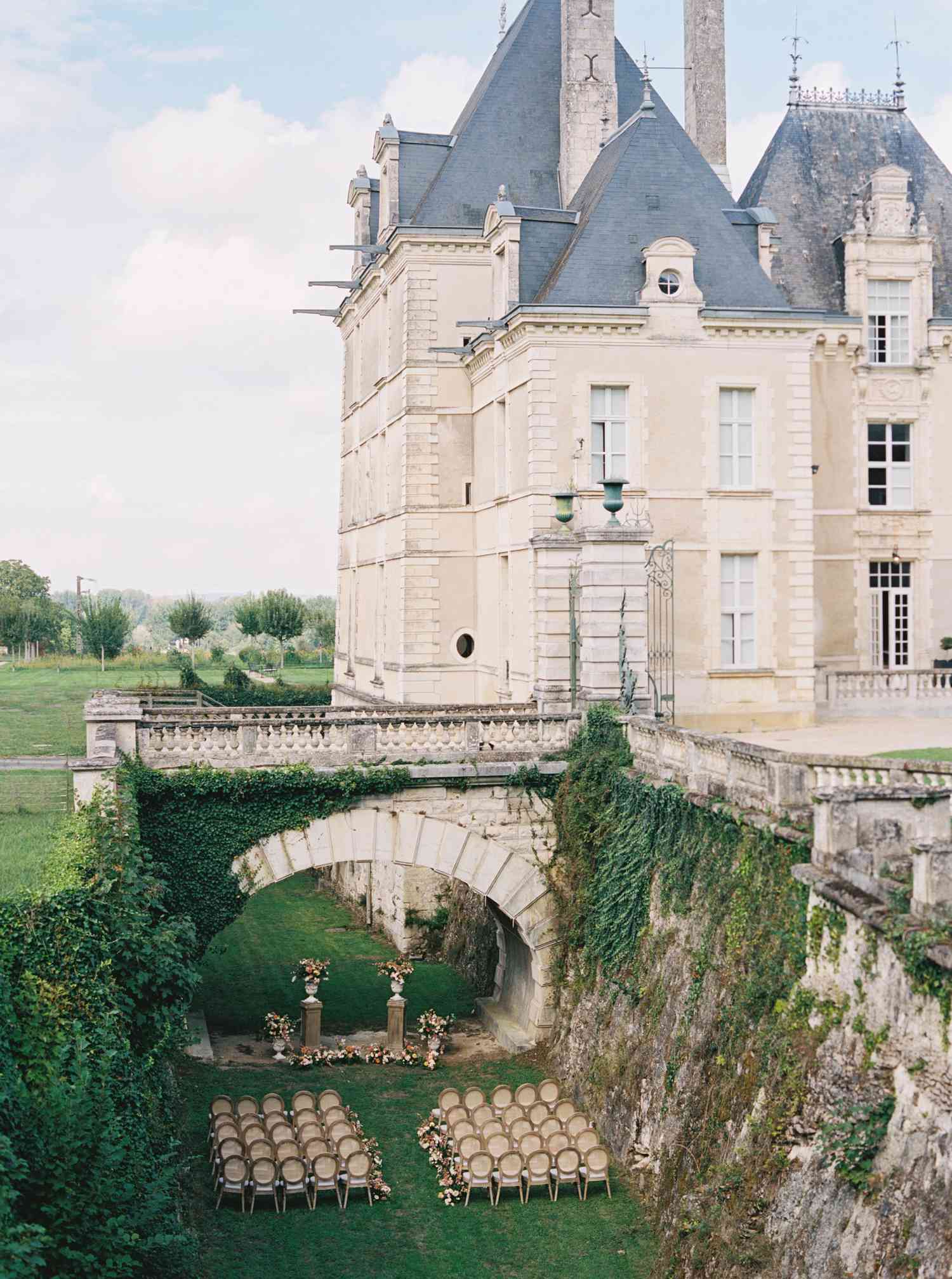
Photo by Sarah Lord Photography & Films
Think Outside Your Budget
While you don’t want to fall for a venue that will launch you into newlywed life under a mountain of debt, considering spaces that seem to be outside your budget can benefit your overall search. “The reason I suggest it is so that you can determine what things you really find a priority for you: It may mean that you restructure your spending plan or guest list to make a higher priced venue an option for you,” says McWilliams.
A higher-priced venue might offer perks that you can add a la carte at a lower-priced one, or—once you compare costs—might have a bottom line that covers items you’d pay extra for at another spot, like an extended reception, a high-end bar service, or a cake. “Every now and again, when you compare included features, some venues end up being a wash,” McWilliams adds. “However, I encourage you to prepare yourself mentally to be okay with not choosing a venue because it’s outside your available spend. I cannot stress enough how important it is to walk in prepared to say no to a venue that just isn’t going to work.”
Still, there’s a fine line between a full-service venue you might be able to afford and one that’s entirely out of reach. “If you are aware that one venue is extremely out of your budget, don't even entertain it,” says Tavares. “It's not fun falling in love with something, a dress or a fabulous purse or whatever it might be, and not being able to get it—that's always not a fun experience. Don't even look at it if it doesn't make sense for you.”
Bring Your Imagination
During your site visits, remember that a daytime tour of an empty, well-lit venue will give you an impression of the space that’s very different from your wedding-day atmosphere. “All of its imperfections will shine clearly—a scratch here, a bump there—I am not saying the venue should be beat up, but wear and tear are a part of a venue,” says Meyer. “At night, under dim lights and candlelight, it goes unnoticed.”
Choosing a venue that you feel has room for improvement—whether with the layout, the décor, or the lighting—can inspire you and your planner to camouflage those flaws with unique and unexpected details. “Empty spaces show you their bones, their potential and possibilities,” says Meyer. “Perfection prevents possibilities, so keep that in mind as you look at venues,”
Visit in Bad Weather
Even if just one part of your day—like the ceremony, cocktail hour, or portraits—will be held outside, you’ll need a Plan B in case of rain. “It is easy to fall in love with a venue with outdoor space on a perfect day, but you have to plan for it to rain and or be cold,” says Meyer. “I prefer clients to see spaces on rainy and or cold days so they know what it could be like, worst case scenario, and they make a plan not with rose-colored glasses on, but a real plan they may need to implement.”
Meyer also encourages his clients to ask about heating and air conditioning policies at your venue. “Some venues have rules that the air conditioning cannot be on if you open the doors and/or windows, some will not guarantee a temperature in their contract, others simply do not have air conditioning, only fans,” he says. “It is important to know, so you are aware and can plan accordingly.”
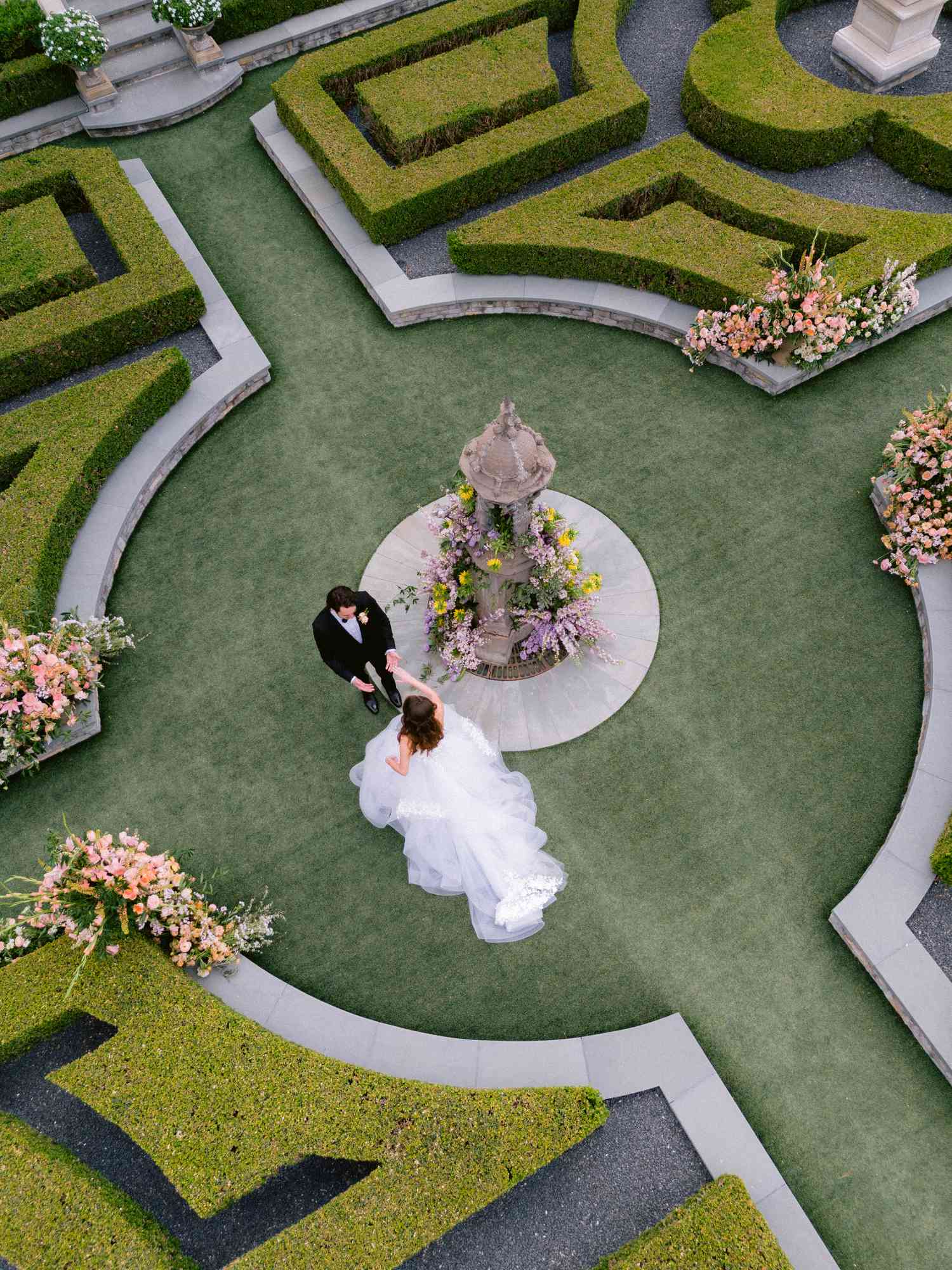
Photo by Jose Villa
Work as a Team
Though plenty of couples prefer to divide and conquer wedding planning tasks, like choosing napkins, creating a cocktail hour playlist, or handling the transportation, you should both be part of the venue selection. “This whole experience is a partnership, and it’s great for everybody to be involved from the beginning,” says Tavares. Another plus to joint visits: You and your partner are likely to ask different questions. “I’ve noticed one might care more about the aesthetics, while the other might care more about the logistics,” says Tavares. “So it’s always really nice to hear the two of them discuss it.”
Bring Your Family (But Not Your Whole Family)
It’s common for couples to have a few parents, friends, or relatives join them for a site visit—especially if those family members are contributing to the costs—but don’t bring your full wedding party, all your siblings, and all of your aunts and uncles, caution the experts. “I always say less is more,” says Tavares. “If you brought seven people to a site visit, they’re going to have seven different opinions. I think having a smaller group is really important—it’s already overwhelming, and then to have seven different opinions—you’re spiraling.”
Once you’ve visited your venues with your family in tow and narrowed down your list to one or two favorites, Tavares recommends asking your planner to set up a second visit for the two of you to go alone. “Then you can really just be together in that space and make sure it's right and there's no no external conversations happening,” she says. “That’s a really nice strategy as well.”
Book a Brand-New Venue With Caution
Being the first couple to exchange vows at a just-opened venue has its pros and cons: You might have more flexibility to customize the experience with vendors who haven’t used the space before, but you also might end up with staffers who are still working out the kinks during your day. “[Don’t do it] without a planner, wedding insurance and a fully seasoned and vetted vendor and creative partner team,” says McWilliams. “A new venue will always come with obstacles and fires, but if you have a top notch team on your side, most things can be overcome. There are often benefits, though, because your rockstar team can make the most of a place [without] the mentality of, ‘We always do it this way.’”
:max_bytes(150000):strip_icc()/18-jonathan-greenard-nfl-wedding-couple-walking-aisle-glorianna-chan-0824-e3a763e2e9d74ddda5eaddf5cce36f70.jpg)
Photo by Glorianna Chan
Don’t Bring Your Checkbook
No matter how much you love a venue, take a beat (or two) to look over the contract and consider the booking after your visit. “In general, that goes for any wedding vendor, or any contract, really,” says Tavares. “Never sign anything in person right then and there, always digest it. Come home, make sure it makes sense, if you have a lawyer in the family or a planner, have him or her look at it. You should never just sign and hand a check to anybody.”
Don’t Expect Perfection
No matter how stunning a venue looks in its online gallery or how much your best friend loved it, remember that no space will be 100-percent faultless. “Rule number one: Lower your expectations!” says Meyer. “You may love a venue but not the floor, or love the space but not a light fixture, or the space is perfect except there is a column oddly placed—no venue is perfect, so know that going in.”
Meyer recommends choosing a venue that you love “80 to 90 percent,” and getting creative with your planning team to draw attention to the elements you like the best. “The rest you can make up with design, décor, and lighting,” he says. “I always ask couples what they love most and least about their venues. We highlight the things they love most, and move the eyes away from the things they love the least.”
